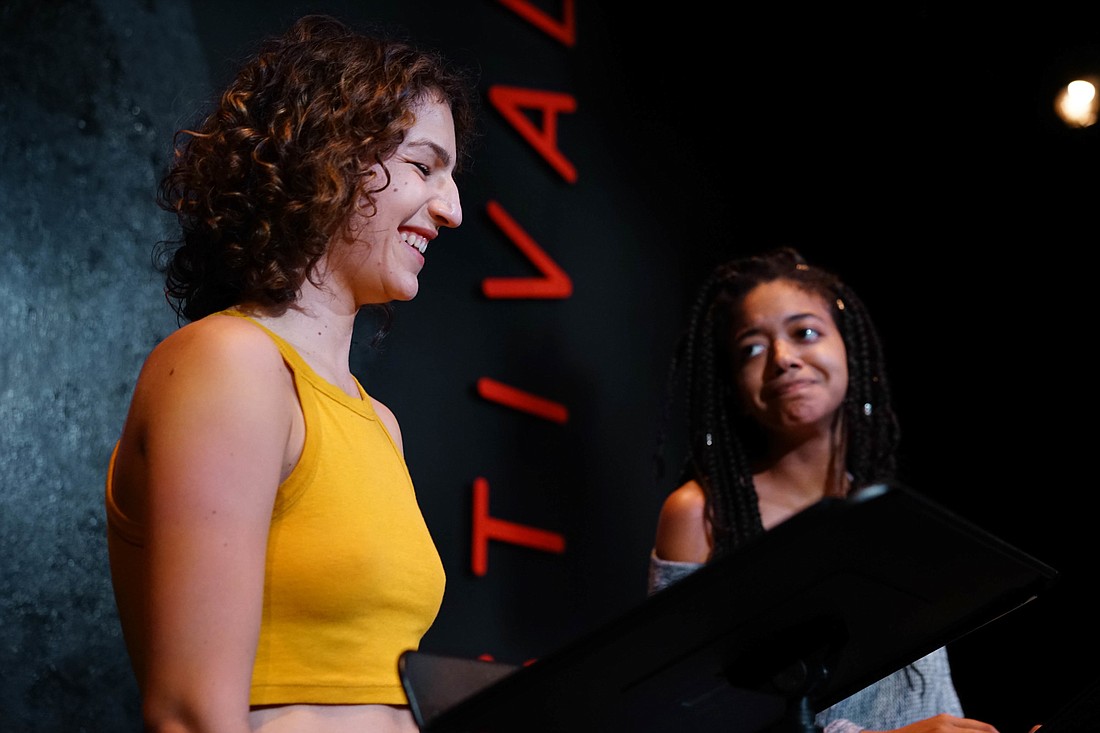- July 14, 2025
-
-
Loading

Loading

Last June, Urbanite Theatre sent out a call for unproduced scripts by female playwrights. They definitely touched a nerve. More than 100 submissions flooded in from around the nation. Their work offered a window into the writers’ minds — and many of those minds are troubled. Family dramas and lighthearted comedy aren’t dead. But it’s not all sunshine and rainbows.
“I think the #MeToo movement had a big effect,” says Co-Artistic Director Brendan Ragan. “Many stories involved the aftermath of assault or sexual violence.”
Over several weeks, a screening committee of 12 local female theater artists culled the submissions to a short list of 10. Only three would be read at the festival. That decision was up to Ragan and Co-Artistic Director Summer Dawn Wallace.
“We started out with 10 outstanding plays,” Wallace notes. “Narrowing it down to the final three was difficult.”
The choice was tough, but they made it.
Mercedes White’s “The Space In Between,” Jayne Hannah’s “Stalking,” and Gina Femia’s “The Violet Sisters” made the final cut.
The winners found a Sarasota audience in staged readings at the Urbanite’s Modern Works Festival from Oct. 2-14. At this point, the audience joined the creative process.
And that’s the theory behind the festival — as I learned, from philosophical discussions with Wallace and Ragan.
The short version?
Our country is awash in entertainment. The experience tends to be passive — a one-way street. Somebody puts on a show; you watch the stage or screen. “Media consumers” often forget the human beings behind it all. After the show, amateur critics might flood social media with praise or scorn. But their typical conversation is a closed circle. The author is usually on the outside — and their work is a done deal. The audience might be talking. But they’re talking behind the author’s back. Who cares? The author isn’t listening.
Not this time.
Not at the Modern Works Festival.
The work on the Urbanite stage was good. Even so, the festival’s plays were works in progress. Nothing was written in stone.
And, for most of the initial readings, the playwright was in the audience. They watched the audience respond to the play reading. Afterwards, they listened to what theatergoers had to say.
“We wanted to create a human connection — the opposite of passive," Wallace says. "The author’s in plain sight — and so is the audience. There’s no place to hide.”
That electric connection was evident at the reading of Jayne Hannah’s “Stalking.” Kim Crow directed; Steven Sean Garland and Casey Wortmann brought the characters to life.
Hannah’s play offered a fierce, fearless exploration of a rapist’s mentality — and the ripple effect of his attack on two generations of women.
The audience was moved.
After the reading, they were moved to speak.
They talked about the ending.
“I wanted a resolution. I …”
“No! I’m glad she didn’t tie everything up. That’d be cheap.”
They talked about the meaning.
“I think it’s all about consequences.”
“Yeah — Jayne said that in the talkback, yesterday. She said she was exploring the repercussions of our time with other people.”
“How five minutes could change someone’s whole life?”
“Exactly.”
They talked about the characters.
Who are they?
“Magda’s a shapeshifter who steals other people’s identities.”
“But she’s damaged goods.”
“I think she’s very sympathetic. You’re afraid for her.”
“I think George started to be sympathetic. When he …”
“Not to me. Not at all.”
These random, anonymous samples only hint of the flavor of the discussion. You had to be there to feel the energy. The Urbanite Theatre resembled a high-level writer’s room. Both on stage and in the audience, the people who stayed for the talk were all passionate, perceptive and invested. There were no passive spectators.
Although Hannah had returned to Rhode Island, she was there in spirit. After the talk, Ragan assured the audience he’d distill their feedback and send it to her. The playwright had already made significant changes to her script, thanks to yesterday’s audience. White had too, after readings of “The Space In Between.”
“You can make a difference,” said Ragan. “Maybe Hannah will take some of your advice — or maybe not. But you’ve definitely participated in the birth of new art. That’s why you’re here — and why this festival exists.”
Next year, the Urbanite plans to do it again. They’ll send out a call to other underrepresented playwrights. Who? That’s still an open question. The second annual Modern Works Festival isn’t written in stone, either.
But new plays will be born.
And new audiences will help bring them into the world.